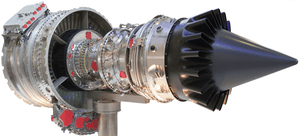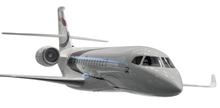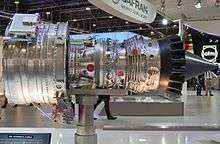Safran Silvercrest
The Safran Silvercrest is a French turbofan currently under development which will be manufactured by Safran Aircraft Engines.
| Silvercrest | |
|---|---|
 | |
| The engine on display at Paris Air Show 2013 | |
| Type | Turbofan |
| National origin | France |
| Manufacturer | Safran |
| First run | September 2012[1] |
| Major applications | Cessna Citation Hemisphere |
| Number built | 7 (as of Summer 2014)[2] |
| Program cost | US$ 500–600 million (2008 information)[3] |
Development
The engine was announced at the 2006 National Business Aviation Association convention.[4] Certification was originally slated for the end of 2010 or early 2011.[5] In early 2008 the high pressure spool and combustor have been run in a US$120 million core-demonstrator called SM-X, reaching the take-off speed of 20,300rpm.[6]

The First Engine To Test started ground testing in September 2012.[1][7] In May 2013, in-flight tests were targeted for the fourth quarter of the year.[8] They finally started in July 2014 on a Grumman Gulfstream II and should take place in Istres-Le Tubé Air Base.[9] In 2015, engine certification was rescheduled for late 2016.[10] In 2015, Safran passed €654 million of depreciation for amortization for the Silvercrest program.[11]
In November 2016, issues were traced to airflow through the engine not as controlled as expected, a side-effect of the axial-centrifugal high-pressure compressor selection, controlling software was adapted to maintain a steady airflow and active clearance controls were added to the low pressure turbine ; in May 2017, altitude tests should begin soon in Russia for an early 2018 certification.[12] The 11,450 lbf (50.9 kN) Silvercrest 2D was to power the Dassault Falcon 5X and the 12,000 lbf (53 kN) 2C the Cessna Citation Hemisphere, EASA certification was expected in spring 2018 and FAA certification in August 2018.[13]
In October 2017, after Safran discovered high-pressure compressor response problems at high altitudes and low airspeeds on its flying testbed in San Antonio, Dassault announced the Falcon 5X introduction could be further delayed after 50 test flight hours, and do not rule out switching its engine supplier. An axial-centrifugal high-pressure compressor is common below 5,000 lbf (22 kN) but rare for the 10,000–12,000 lbf (44–53 kN) range. Textron Aviation declared that they were confident that these problems will be solved when it powers the Citation Hemisphere.[14] Until 2015, issues were mostly oil-fuel heat exchanger problems, carcass distortion and clearance control challenges of the high-pressure section.[15]
Optimizing the settings, the control laws and positioning of the variable stator vanes will recover a part of the losses, but not all. Flowpath will not be too modified and no stages or vanes will be added, the fixes selection will establish the length of the delay and the schedule will be revised before 2017 ends to recover all the surge margin and to operate as planned across the flight envelope. The problem is due to the axial part, not the centrifugal, and is not related to the overall compressor architecture.[16] At this time the test engines had logged 800 flights, and the one concerned had 90 hours, including 30 hours on the ground and 60 hours in the air.[17]
On 13 December 2017, Dassault abandoned the Silvercrest due to technical and schedule risks, ended the 5X development and launched a new Falcon with the same cross section, Pratt & Whitney Canada engines and a 5,500 nmi (10,200 km) range for a 2022 introduction. Compliant Silvercrest engines were originally planned for the end of 2013 but technical issues led Safran to postpone them to the end of 2017, leading to delay the 5X introduction from 2017 to 2020, and the high pressure compressor issues in the fall of 2017 delayed it further with performance shortfalls, preventing a 2020 service entry.[18]
In December 2017, Textron Aviation declared that the Silvercrest delays did not impact the Hemisphere programme with a first flight still planned in 2019 and an introduction after 2020 and Textron confirmed its selection for the Hemisphere after Dassault cancelled the 5X.[19] However, in April 2018, they declared that they suspended the Hemisphere Program because of the ongoing problems with the Silvercrest engine.[20]
In May 2018, Safran announced it had launched a high-pressure compressor redesign for a go-ahead decision by the middle of 2019, after testing, shelving the Hemisphere program if problems cannot be fixed.[21] The redesigned compressor will be tested in July 2019 to prove the engine operation.[22] By October 2018, Safran had amassed over 9,000 test hours and 300 in flight.[23] Safran needs a second customer to justify its investment, but is still optimistic for the engine's future.[24]
In July 2019, Textron suspended the Cessna Citation Hemisphere development as its turbofans did not meet objectives: the new high pressure compressor exceeded expectations during ground tests but further trials are necessary to "confirm engine improvements and complete overall engine performance and durability validation" and Safran will continue the effort as an "R&T platform".[25] For Safran, insufficient skills retention is causing the repetition of technical issues as design engineers retire.[26]
Design
_(cropped).jpg)
It was originally designed as an 8,500–10,500 lbf (38–47 kN) thrust turbofan.[27] It should power super mid-size to large cabin business jets or 40 to 60-seat regional jets with a Maximum Takeoff Weight of 45,000 to 60,000 lb (20,000 to 27,000 kg).[28] In 2016 the thrust range was quoted as 10,000–12,000 lbf (44–53 kN).[29]
The two-shaft engine architecture includes a 42.5 in (108 cm) fan with solid wide-chord swept blades, followed by 4 booster stages, all driven by a 4-stage low pressure turbine. The high pressure spool has 4 axial compressor stages and 1 centrifugal stage, driven by a single-stage turbine.[1] An axi-centrifugal compressor is unusual for an engine in this thrust range.[29] Turbomeca, which like Snecma is a part of the SAFRAN Group, participates in the design of the centrifugal compressor stage.[5]
Design in 2007 featured a smaller 40-inch fan, no booster, one more high-pressure compressor stage, one low-pressure turbine stage less and a lower 4.5 bypass ratio, a 27:1 overall pressure ratio and a core pressure ratio of "over 17".[5][30]
Applications
- Silvercrest 2C
- Cessna Citation Hemisphere, first flight 2019, with over 12,000 lbf (53 kN) of thrust.[31] Textron announced the suspension of the program in April 2018.[20]
- Silvercrest SC-2D
- Dassault Falcon 5X ; 11,450 lbf (50.9 kN), both aircraft and official engine selection were simultaneously unveiled at the National Business Aviation Association annual convention on October 21, 2013, entry into service was delayed to 2020.[32] Dassault announced the cancellation of the 5X program on 13 December 2017.[18] On 6 September 2018, Dassault Aviation and Safran ended with US$280 million in compensatory damages paid by Safran.[33]
Specifications (2D)

Data from Snecma.[34]
General characteristics
- Type: axial and centrifugal flow, twin-shaft, bypass turbofan engine
- Length: approx. 74 inches (1,900 mm)[5]
- Diameter: 42.5 inches (1,080 mm) Fan
- Dry weight: 2,290 lb (1,040 kg)[35]
Components
- Compressor: 4 low-pressure stages, 4 high-pressure blisks + 1 centrifugal stage
- Turbine: 1 high-pressure, 4 low-pressure stages
Performance
- Maximum thrust: 11,450 lbf (50.9 kN)
- Overall pressure ratio: 38.5 [36]
- Bypass ratio: 5.9:1
- Thrust-to-weight ratio: 5[35]
See also
Comparable engines
Related lists
References
- Thierry Dubois (31 Oct 2013). "Snecma puts Silvercrest engine to test". Aviation International News.
- "Engines special report: Snecma". Executive & VIP Aviation International. Summer 2014.
- "Snecma va investir 600 millions de dollars dans le Silvercrest". L'usine nouvelle (in French). 30 Jan 2008.
- "SILVERCREST: a new name in propulsion for business aviation". SAFRAN. 17 Oct 2006.
- Thierry Dubois (5 May 2007). "Snecma Silvercrest core engine set for first run". Aviation International News.
- Thierry Dubois (20 May 2008). "Snecma Silvercrest engine completes core tests". Aviation International News.
- Ian Goold (20 May 2013). "Snecma Close To Second Application For Silvercrest". Aviation International News.
- Dominic Perry (23 May 2013). "Snecma eyes maiden Silvercrest sortie in fourth quarter". Flightglobal.
- Thierry Dubois (15 Jul 2014). "Snecma Begins Flight-testing Silvercrest on Modified Gulfstream II". Aviation International News.
- "Snecma Silvercrest Schedule Slips into 2016". Aviation International News. 12 Mar 2015.
- Guillaume Lecompte-Boinet (February 28, 2018). "Snecma Mum on Silvercrest, Ramping Up on CFM Leaps". AIN.
- Murdo Morrison (19 May 2017). "Rivals for power in the business aviation engine market". Flight Global.
- Chad Trautvetter (June 26, 2017). "Safran Silvercrest To Have Two Takeoff Thrust Ratings". Aviation International News.
- Stephen Trimble (9 Oct 2017). "Dassault discloses new delay for Falcon 5X". Flightglobal.
- Guy Norris (Oct 10, 2017). "Safran Engine Issues Cause Further Dassault Falcon 5X Delay". Aviation Week Network.
- Guy Norris (Oct 11, 2017). "Safran Mulls Silvercrest Fix Options". Aviation Week Network.
- Matt Thurber (October 11, 2017). "Safran Planning Fix for Silvercrest Compressor Issue". AIN.
- "Dassault confirms termination for 5X" (Press release). Dassault. 13 December 2017.
- Stephen Trimble (13 Dec 2017). "Textron Aviation still committed to Silvercrest engine for Hemisphere". Flightglobal.
- "Textron Aviation Suspends Citation Hemisphere Program". Aviation International News. 2018-04-18. Retrieved 2018-05-04.
- Stephen Trimble (28 May 2018). "Silvercrest compressor redesign underway as Hemisphere awaits decision". Flightglobal.
- Matt Thurber (September 20, 2018). "Hemisphere Still Part of Textron Aviation's Future". AIN.
- Mark Huber - (October 17, 2018). "Safran: Silvercrest Fix To Test in Mid-2019". Aviation International News.
- Dominic Perry (25 Oct 2018). "Safran still needs additional Silvercrest customers". Flightglobal.
- Michael Gubisch (17 July 2019). "Textron suspends Cessna Hemisphere programme". Flightglobal.
- Guy Norris and Thierry Dubois (Jul 25, 2019). "Safran Back To Square One In Business Aviation". Aviation Week & Space Technology.
- Jeff Apter (30 Nov 2006). "Snecma develops new bizav engine". Aviation International News.
- "Snecma Announces Silvercrest Core demonstrator First Parts Delivered". SAFRAN. 22 May 2007.
- "Safran Reveals Revised Silvercrest Test Plan". Aviation Week. November 1, 2016.
- Thierry Dubois (30 Apr 2007). "Snecma Silvercrest core to run later this year". Aviation International News.
- "Cessna selects engine, avionics and fly-by-wire suppliers for the latest in its large-cabin Citation business jet family" (Press release). Textron Aviation. October 31, 2016.
- "Dassault confirms two-year delay for 5X". flightglobal.com. 2016-01-29. Retrieved 2016-01-29.
- "Signature of an amicable settlement with Safran" (Press release). Dassault Aviation. 2018-09-06.
- "Silvercrest 2D for the Dassault Aviation Falcon 5X". Safran Aircraft Engines.
- "Snecma's Silvercrest To Power New Falcon Jet". Aviation International News. October 22, 2013.
- "New Aircraft Concepts for Improved Environmental and Energetic Efficiency" (PDF). Técnico Lisboa. November 2014.
External links
| Wikimedia Commons has media related to Safran Silvercrest. |
- Official website
- Safran’s Move Into Business Aviation is Back on Track With Silvercrest Engine. Aviation International News. November 9, 2016.